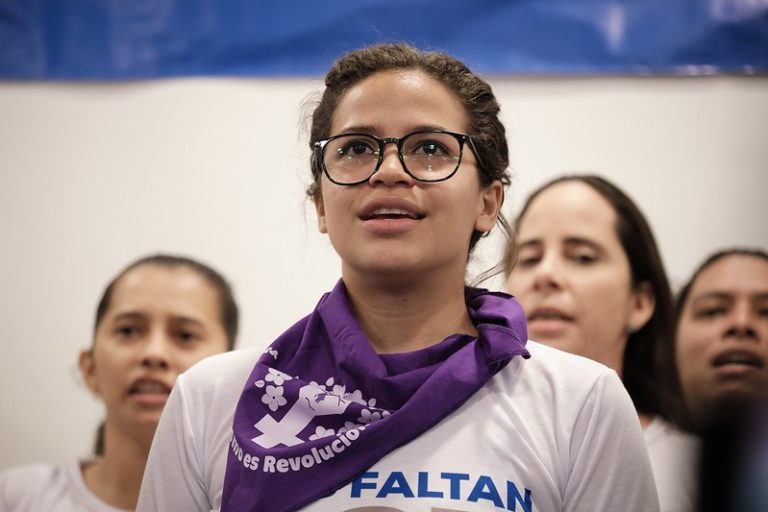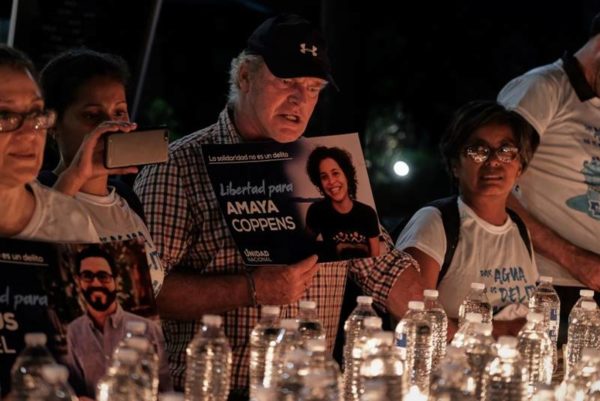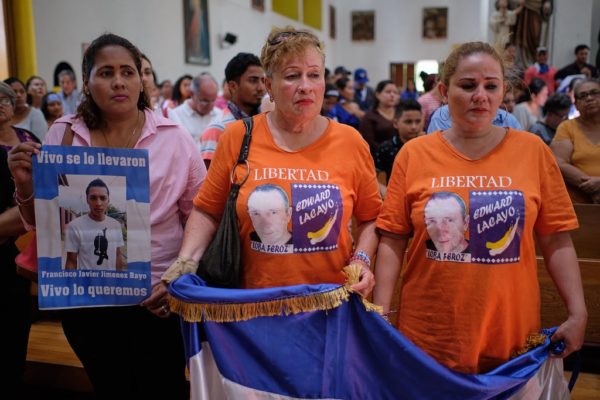17 de noviembre 2020

Children of Exile: The Births “Sowing Hope” in the Camp of Nicaraguan Farmers

PUBLICIDAD 1M
PUBLICIDAD 4D
PUBLICIDAD 5D
One year after her second jail term began, the student and political leader speaks about the current prisoners’ hunger strike

There are too many things that we continue hushing up in the name of unity. I expected the attacks
On November 14, 2019, fear once more enveloped Amaya Coppens Zamora. That was the day she was imprisoned for the second time. She had only been out of prison for five months, following nine months locked up. That first time, she had been jailed for opposing the regime of Daniel Ortega and Rosario Murillo in 2018.
“For me, in prison was a protest.” Coppens explains. “It represented a loud scream that I didn’t agree with what was happening in Nicaragua.” At the time, Amaya was studying Medicine at Nicaragua’s National Autonomous University in Leon. Like many other protesters, she was imprisoned for being a “terrorist.”
The second time, she was imprisoned for “arms possession”, together with 15 other young people. In reality, they were bringing medicine and water to a group of family members of the political prisoners. The group had initiated a hunger strike in a Masaya church, in support of their imprisoned children and relatives. The young people arrested for bringing supplies to the hunger strikers were dubbed “the Water Carriers”.
A year has now passed since this second imprisonment, which lasted for a month and a half. Coppens maintains that even in prison, “we can’t stop denouncing what’s going on.” However, she believes that the worst effects of being jailed fall on the family members. For that reason, Coppens has distanced herself from political organizations, and dedicates her time to accompanying the prisoners’ family members. Along with these families, she remains focused on the demand to free all the political prisoners.
On Sunday, November 15th, Amaya Coppens was interviewed as part of the weekly YouTube news program Esta Semana. In the interview, she demanded firm commitment and conclusive action from all the sectors advocating for this same cause.
The face of this young woman, now 26, became internationally known during 2018. In part, this was because of her dual nationality. Amaya was born in Belgium, but raised in Esteli, in northern Nicaragua. “That has allowed me to broaden the denunciation and shine a light on what Nicaraguans are going through,” she affirms. However, her cries for freedom for all are remain unanswered. For the third year in a row, Nicaraguans clamor for a “Xmas without political prisoners”.
Coppens and the “Water Carriers” were released on December 30, 2019, after intense protests in demand of their freedom. A total of 91 prisoners of conscience were released on that date, but 65 more remained in prison.

Federico Coppens (center) and Tamara Zamora (r), Amaya Coppen’s parents. The photo was taken in November of last year. They were participating in a vigil to demand freedom for their daughter and the rest of the political prisoners. Photo: Carlos Herrera.
The cry almost immediately arose: “We’re missing 65+”. The demand on behalf of these remaining prisoners began in January 2020. Unfortunately, eleven months later, that number hasn’t shrunk. On the contrary, it’s risen to over 100 current prisoners of the dictatorship.
To Coppens, this situation demonstrates that “the regime isn’t interested in restoring our citizen’s rights.” Instead, “they continue to hold prisoners in inhumane conditions. They force their family members to sign documents affirming that they’ve been well treated. Families sign these documents under threat of being banned from visitation.”
Given this scenario, she concludes: “We can’t delude ourselves that this regime is going to become a government.”
At the end of September, over 50 political prisoners initiated a temporary hunger strike to elevate their cry for freedom. This week, seven of those in the punishment cells announced that they were renewing the action. Coppens calls this: “a cry not to be forgotten.”
“This protest is a demand. They feel that they’ve been abandoned. This is a sign of deep desperation. When you’re in jail, there’s very little of normal life left to you. Eating is one of the few pleasures left you in a day. To decide to renounce this requires great conviction, because you begin feeling like you’re getting sick,” Coppens explains. When she was in prison, she participated in a long hunger strike, along with other prisoners of conscience.
Amaya Coppens is convinced that this form of protest represents the prisoners’ desperation. Now, “it falls to us as a people to serve as megaphones for this cry reaching us from the prisons.”

Family members of political prisoners Francisco de Javier Jimenez and Edward Lacayo. A mass was held for their freedom in June 2019. Archived photo: Carlos Herrera / Confidencial
“The political prisoners have managed to stand up and resist and have initiated hunger strikes in the jails. So, it’s inconceivable that organizations on the outside aren’t capable of doing this. I continue demanding that these organizations take actions that are consistent with their stances. That they back this strike. The family members, in turn, have also proposed more commitment, for example from business groups.” Amaya offered these declarations during the interview broadcast on November 15 over the “Confidencial Nica” YouTube channel.
Regarding the possibility for elections in 2021, Coppens added brusquely: “these can’t be held with political prisoners in the jails.”
“We can’t,” she asserted, “have elections without previous conditions. They continue violating the human rights of many people every day. We can’t have elections with repression, and without any safeguards for the return of the thousands who are in exile.”
Amaya Coppens discounts the idea of leaving Nicaragua to avoid being arrested anew. On the contrary, she states firmly: “I’ll continue with this struggle.”
The university student regrets that she hasn’t been allowed to continue her Medical studies. “That’s my biggest frustration,” she admits. However, she’s also convinced that the rebellion that began in April 2018, represented “a rupture” with the current political system. “There’s no possible return.”
“We’re fighting for what’s right, even though they want to repress and silence us. We must continue insisting, until we succeed in changing the reality that exists in our country.”
Coppens no longer belongs to the April 19th University Movement in Leon. This was the organization through which she initially got involved in the protest movement. She explains that she’s currently focused on working for political prisoners’ release.
“You have to realize that time has passed, and it’s weighed heavily on many of us. We must take into consideration that many of us were left with nothing. It’s hard to continue in the struggle without a support network, persecuted, fleeing,” she notes.
She understands that many people “have had to look for a way to survive any way they can.” The young people haven’t only had to cope with the dictatorship. They’ve also had to deal with the ambitions of the political old guard. “These parties that historically made the decisions are the ones who allowed us to get into the situation we’re in.”
Amaya points out: “some parties have been resurging and turning their backs on what April 2018 signified. These are political corpses who should never have been resurrected. Parties, people, who’ve been denounced for acts of corruption.” To Coppens, that irritation, “is also part of the people’s clamor. We see it on the social networks. It’s time to listen to what the people are asking for.”
She continues: “We must keep demanding on behalf of the prisoners, the victims, the 100,000+ Nicas who still can’t return.”’
“A lot of people are out there,” she declares, “awaiting the moment, because they don’t agree with what’s happening. I’m sure that if we recover the [constitutional] guarantees, we’re going to see a new insurrection arise. People are out there, waiting, for the right moment to come out again.” Amaya doesn’t believe they need to be convoked by the opposition organizations – the Civic Alliance or the National Coalition. “This insurrection was born as a self-organized movement, out of solidarity,” she recalls.
At the beginning of March, Amaya Coppens was one of the winners of the International Women of Courage award. This is awarded annually by the US State Department. It purports to recognize those women all over the world who have demonstrated exceptional courage and leadership. They must have done so in defense of peace, justice, human rights, gender equality and women’s empowerment.
The released political prisoner states: “more than a personal award, this was a recognition of the Nicaraguan people’s struggle. It was also an opportunity to elevate our voices on the international level regarding the regime’s abuses.”
The group of released prisoners, she tells us, hasn’t been allowed to return to their daily lives. For Coppens, the most difficult aspect is not being able to see her family members and friends in peace. “I have to avoid putting at risk the people I’m with. Any person close to me could be persecuted or taken prisoner. This regime considers us pariahs. With their discourses of hate, they treat us almost like we had a contagious disease,” she declares.
One year after her second imprisonment, she also admits she fears returning to prison, mostly because of her family.
While she was imprisoned, her father, Federico Coppens, and her two brothers, Diego (28) and Santiago (16) were beaten by a mob. Her mother, Tamara Zamora, was also humiliated outside the prison gates. “While inside, I suffered more thinking about them than I did thinking about being deprived of freedom,” she declares.
Amaya Coppens recognizes that – like many Nicaraguans – she feels frustrated seeing how the regime continues clinging to power. However, she states that “small gestures of solidarity” fill her with faith.
“It fills me with hope seeing how people have organized spontaneously to help during the COVID-19 pandemic. Or, in response to Hurricane Eta. I believe that you will always find someone who extends a hand to you. I’m certain that there are more good people than people who repress,” she maintains.
Proof of that, she recalls, is that within prison itself, she sometimes encountered encouraging words from some of the prison workers. She also received such words “from prisoners who they paid to mistreat us.”
Archivado como:
PUBLICIDAD 3M
Periodista nicaragüense, con dos décadas de trayectoria en medios escritos y digitales. Fue editor de las publicaciones Metro, La Brújula y Revista Niú. Ganador del Grand Prize Lorenzo Natali en Derechos Humanos.
PUBLICIDAD 3D